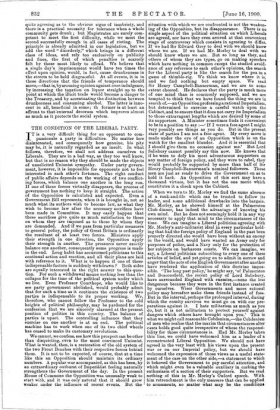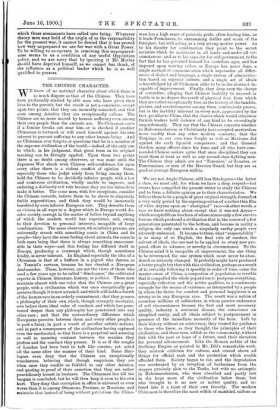THE CONDITION OF THE LIBERAL PARTY.
IT is a very difficult thing for an opponent to com- passionate a party in difficulties. No matter how disinterested, and consequently how genuine, his pity may be, it is naturally regarded as an insult. In what follows, therefore, we shall not address ourselves to Liberals. They are in a bad way, as they too well know, but that is no reason why they should be made the objects of unsolicited Unionist sympathy. Under party govern- ment, however, it is impossible for opponents not to feel interested in each other's fortunes. The right conduct of public affairs depends on the working of two conflict- ing forces, which balance one another in the long run. If one of these forces virtually disappears, the process of government has nothing to keep it straight. The action of the Opposition is calculated and expected. Even a Government Bill represents, when it is brought in, not so much what its authors wish to become law, as what they wish to become law after the necessary sacrifices have been made in Committee. It may easily happen that these sacrifices give quite as much satisfaction to those on whom they are imposed as to those by whom they are demanded. And if we pass from particular measures to general policy, the policy of Great Britain is ordinarily the resultant of at least two forces. Ministers apply their strength in one direction, the Opposition apply their strength in another. The pressures never exactly balance one another, consequently some progress is made in the end. Long habit has accustomed politicians to this continual action and reaction, and all their plans are laid with reference to it. What is to happen if one of these indispensable factors is suddenly withdrawn ? Both sides are equally interested in the right answer to this ques- tion. For such a withdrawal means nothing less than the collapse for the time of the political system under which we live. Even Professor Courthope, who would like to see party government abolished, would probably admit that for such a time as it continues the existence of two partjes is indispensable to its proper working. We, therefore, who cannot follow the Professor to the cold heights of political philosophy, may be pardoned for the confession that we are sincerely alarmed at the present position of politics in this country. The balance of parties is upset. The controlling influence that they exercise on one another is at an end. The political machine has to work when one of its two chief wheels has ceased to make its customary revolutions.
We cannot, we confess, see how this prospect can be other than disquieting, even to the most convinced Unionist. What is wanted, then, is a restoration of the old system of the two Front Benches with their respective forces behind them. It is not to be expected, of course, that at a time like this an Opposition should maintain its ordinary numbers. A popular war accompanied, as this has been, by an extraordinary outburst of Imperialist feeling naturally strengthens the Government of the day. In the present House of Commons the Opposition was unusually weak to start with, and it was only natural that it should grow weaker under the influence of recent events. But the situation with which we are confronted is not the weaken- ing of the Opposition, but its disappearance. There is no single aspect of the political situation on which Liberals are agreed, nor have they even arrived at that convenient stage of controversy which consists in agreeing to differ. If we had Sir Edward Grey to deal with we should know where we are. If we had Mr. Morley to deal with we should know where we are. , But so long as they, and others of whom they are types, go on making speeches which have nothing in common except the studied avoid- ance of any reference to each other's opinions, the search for the Liberal party is like the search for the pea in a. game of thimble-rig. We think we know where it is, and we find nothing but empty space. We read Sir Henry Campbell-Bannerman, and we are to some extent cheered. He declares that the party is much more of one mind than is commonly supposed, and we are tempted to think that we have found the thing we are in search of,—an Opposition professing a rational Imperialism, but determined to exercise a careful watch upon the Cabinet, and to ensure that it does not carry its Imperialism to those extravagant lengths which are desired by some of its supporters. A Minister sometimes finds it convenient to be in a position to say If I were a free agent I might very possibly see things as you do. But in the present state of parties I am not a free agent. My every move is made under the eye of an Opposition which is on the watch for the smallest blunder. And it is essential that I should give them no occasion against me.' But Lord Salisbury cannot possibly say this now. He knows that if he were to defy his most adventurous supporters on any matter of foreign policy, and they were to rebel, they would probably be supported by more than half of Sir Henry Campbell-Bannerman's nominal followers. These men are just as ready to drive the Government on as to hold it back. An Opposition of this sort may have a thousand virtues, but it has not the one merit which constitutes it a cheek upon the Cabinet.
When we turn to Mr. Morley we find the same absence of a rank-and-file which can be trusted to follow its leader, and some additional drawbacks into the bargain. Mr. Morley, as he showed himself at the Palmerston Club dinner, has indeed the advantage of knowing his own mind. But he does not seemingly hold it in any way necessary to apply that mind to the circumstances of the time. We can imagine a Liberal politician agreeing with Mr. Morley's anti-militarist ideal in every particular hold- ing that had the foreign policy of England in the past been properly directed she would have been without an enemy in the world, and would have wanted an Army only for purposes of police, and a Navy only for the protection of her subjects on barbarous coasts. We can imagine, we say, a Liberal politician subscribing to every one of these articles of belief, and yet going on to admit in sorrow and anger that the acts of one English Government after another have rendered the application of this doctrine impos- sible. The long past policy,' he might say, 'of Palmerston and Beaconsfield, the recent policy of Lord Salisbury, have surrounded England with enemies,—none the less dangerous because they were in the first instance created by ourselves. Wiser Governments and more rational policy may hereafter make them friends instead of foes. But in the interval, perhaps the prolonged interval, during which the enmity survives we must go on with our pre- parations against it. I hate militarism as much as you do, but it is not militarism to protect yourself against dangers which others have brought upon you.' This is what we might call reasonable Cobdenism,—the Cobdenism of men who realise that the maxim that circumstances alter cases holds good quite irrespective of whose the responsi- bility for those circumstances is. Had Mr. Morley taken this line, we could have welcomed him as a leader of a reconstructed Liberal Opposition. We should not have agreed in the very least with his views upon the present war or on our Imperial policy, but we should have welcomed the expression of those views as a useful state- ment of the case on the other side,—a statement to which it behoved the Government to pay careful attention, and which might even be a valuable auxiliary in curbing the enthusiasm of a section of their supporters. But we read nothing of this in Mr. Morley's Oxford speech. With him retrenchment is the only measure that can be applied to armaments, no matter what may be the conditions which those armaments have called into being. Whatever theory men may hold of the origin of or the responsibility for the present war, it cannot be denied that it has proved how very unprepared we are for war with a Great Power. To be willing to co-operate in removing this unprepared- ness seems to us a condition of any useful Opposition policy, and we are sorry that by ignoring it Mr. Morley should have deprived himself, as we cannot but think, of the influence as a political leader which he is so well qualified to possess.







































 Previous page
Previous page